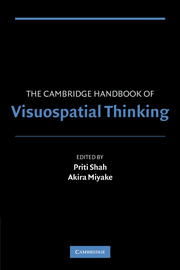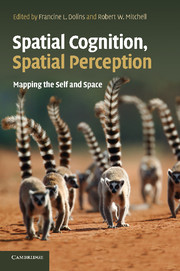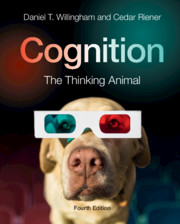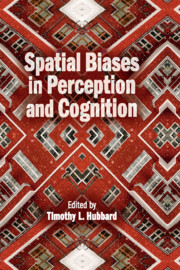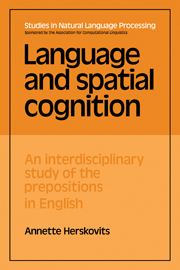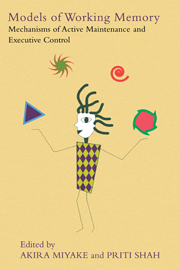The Cambridge Handbook of Visuospatial Thinking
Part of Cambridge Handbooks in Psychology
- Editors:
- Priti Shah
- Akira Miyake, University of Toronto
- Date Published: July 2005
- availability: Available
- format: Paperback
- isbn: 9780521001731
Paperback
Other available formats:
Hardback, eBook
Looking for an inspection copy?
This title is not currently available for inspection. However, if you are interested in the title for your course we can consider offering an inspection copy. To register your interest please contact [email protected] providing details of the course you are teaching.
-
The ability to navigate across town, comprehend an animated display of the functioning of the human heart, view complex multivariate data on a company's website, or to read an architectural blueprint and form a three-dimensional mental picture of a house are all tasks involving visuospatial thinking. The field of visuospatial thinking is a relatively diverse interdisciplinary research enterprise. An understanding of visuospatial thinking, and in particular, how people represent and process visual and spatial information, is relevant not only to cognitive psychology but also education, geography, architecture, medicine, design computer science/artificial intelligence, semiotics and animal cognition. The goal of this book, first published in 2005, is to present a broad overview of research on visuospatial thinking that can be used by researchers as well as students interested in this topic in both basic research and applied/naturalistic contexts.
Read more- Overview of the interdisciplinary field of visuospatial thinking with 12 integrative chapters that are extensively cross-referenced
- These chapters focus on higher level visuospatial thinking and there are no other books that currently do so
- Balanced treatment of both basic and applied work
Reviews & endorsements
' … a wonderful book for anyone who subscribers to the cognitive psychology paradigm.' American Journal of Psychology
Customer reviews
17th Oct 2024 by UName-465163
I want to learn knowledge from the book to finish my report. Thank you
Review was not posted due to profanity
×Product details
- Date Published: July 2005
- format: Paperback
- isbn: 9780521001731
- length: 580 pages
- dimensions: 227 x 153 x 30 mm
- weight: 0.762kg
- contains: 75 b/w illus. 8 tables
- availability: Available
Table of Contents
1. Functional significance of visuospatial representations Barbara Tversky
2. Visuospatial images Daniel Reisberg and Friderike Heuer
3. Disorders of visuospatial working memory Robert Logie and Sergio Della Sala
4. Individual differences in spatial abilities Mary Hegarty and David Waller
5. Sex differences in visuospatial abilities: more than meets the eye Diane F. Halpern and Marcia L. Collear
6. Development of spatial competence Nora S. Newcombe and Amy E. Learmonth
7. Navigation Daniel R. Montello
8. Mapping the understanding of understanding maps Holly A. Taylor
9. Spatial situation models Mike Rinck
10. Design applications of visual spatial thinking: the importance of frame of reference Christopher D. Wickens, Michele Vincow and Michele Yeh
11. The presentation and comprehension of graphically-presented data Priti Shah, Eric G. Freedman and Ioanna Vekiri
12. Multimedia learning: guiding visuospatial thinking with instructional animation Richard E. Mayer.
Sorry, this resource is locked
Please register or sign in to request access. If you are having problems accessing these resources please email [email protected]
Register Sign in» Proceed
You are now leaving the Cambridge University Press website. Your eBook purchase and download will be completed by our partner www.ebooks.com. Please see the permission section of the www.ebooks.com catalogue page for details of the print & copy limits on our eBooks.
Continue ×Are you sure you want to delete your account?
This cannot be undone.
Thank you for your feedback which will help us improve our service.
If you requested a response, we will make sure to get back to you shortly.
×
